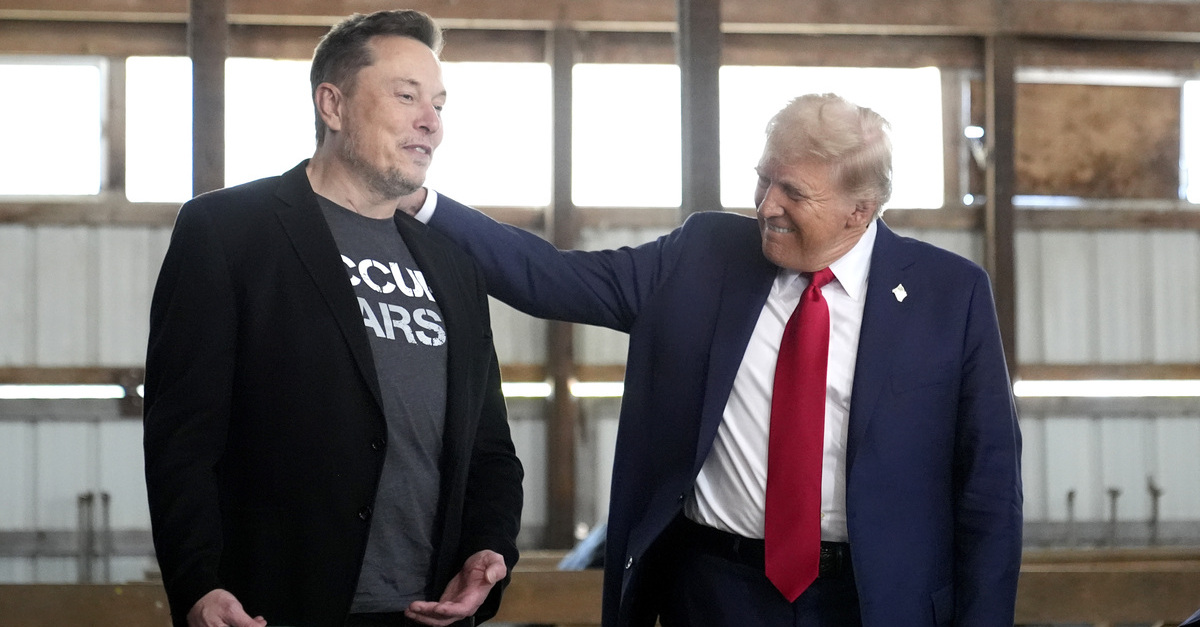
Tesla and SpaceX CEO Elon Musk, left, and then-Republican presidential nominee former President Donald Trump attend a campaign event at the Butler Farm Show, Saturday, Oct. 5, 2024, in Butler, Pa. (AP Photo/Alex Brandon).
Consequences and repercussions are the order of the day in various court cases targeting the Trump administration’s Department of Government Efficiency (DOGE).
The twin concepts, of course, refer to the results, direct and indirect, respectively, of an action.
The action occurred on Tuesday night: President Donald Trump made an admission that no attorney for the Trump administration has been willing or able to do so far. During a joint session of Congress, the 45th and 47th president said Elon Musk was, in fact, in charge of DOGE.
“To further combat inflation, we will not only be reducing the cost of energy, but will be ending the flagrant waste of taxpayer dollars,” Trump said. “And to that end, I have created the brand new Department of Government Efficiency, DOGE. Perhaps you’ve heard of it. Perhaps. Which is headed by Elon Musk, who is in the gallery tonight.”
Consequently, that portion of the president’s speech is now a matter of the court record in at least two cases challenging the authority of Musk, DOGE, and the organization’s efforts to cut federal spending.
In both pleadings and prior public appearances, administration officials have evasively defined DOGE and its operating structure.
Much consternation — in various lawsuits filed against DOGE, Musk and the administration — has resulted from how, exactly, DOGE is being defined and under what authority the group operates. Part and parcel of this dispute is the fact that the former U.S. Digital Service was renamed the U.S. DOGE Service (USDS). At the same time, however, the administration has been cagey about whether or not this is the group of “special employees” that answers to Musk.
Last week, after weeks of questions in lawsuits and during press briefings, the administration announced that Amy Gleason formally serves as the USDS administrator. But that announcement did little to alleviate concerns. At least one judge was just as — if not more — perplexed about DOGE’s structure after the Gleason news broke.
More Law&Crime coverage: ‘That seems like a knowable fact, doesn’t it?’: Judge upbraids Trump admin lawyer for lack of knowledge and ‘strange disconnect’ about how DOGE operates
Now, Trump’s identification of Musk as the “head” of DOGE has likely injected some relevant issues into the ongoing legal maneuvering.
In one set of consolidated cases, filed in D.C. federal court, the collective plaintiffs filed a motion citing new evidence based on Trump’s praise and identification of Musk with regard to DOGE.
This new evidence, the plaintiffs wrote, “conclusively demonstrates that expedited discovery is urgently needed to ascertain the nature of the Department of Government Efficiency and its relationship to the United States DOGE Service.” The motion notes that, on paper, “Amy Gleason is the Acting Administrator” of the USDS.
In the underlying litigation, the three groups of plaintiffs are seeking various forms of relief. But in their new evidence motion, two of the plaintiff groupings have seized on Trump’s admission to support their ongoing efforts to prize information away from the government. In two subsequent motions, the plaintiffs in the case moved for expedited discovery — which the government immediately opposed.
Another case filed in the Maryland federal court system is premised on the idea that Musk’s powerful position violates the U.S. Constitution’s Appointments Clause and separation of powers.
This argument attacks the basic constitutional legitimacy of DOGE’s leader with an iteration of the argument that spelled doom for onetime special counsel Jack Smith in the Mar-a-Lago case. As Law&Crime previously reported, a similar lawsuit was filed on the same day by a coalition of 14 states in Washington, D.C., federal court.
The Maryland case plaintiffs used a different procedural vehicle — a letter motion for judicial notice or to supplement the record — but also moved to put Trump’s description of Musk before the court.
“Judicial notice is appropriate here because the fact of President Trump’s admissions ‘is not subject to reasonable dispute’ and is ‘accurately and readily determined from sources whose accuracy cannot reasonably be questioned,”” the letter motion reads. “Indeed, President Trump made these remarks before a joint session of Congress and on live television before millions of Americans; the full transcript is readily available.”
And, in this instance, the government appears to be standing down.
“Plaintiffs respectfully write to bring to the Court’s attention additional relevant admissions made last night,” the letter motion reads. “Defendants consent to providing these facts to the Court.”
Now that Trump’s statements are in the record, the plaintiffs in each case, of course, are hoping the repercussions inure to their benefit.
While the district courts are now free to consider the statements about DOGE being “headed” by Musk, the U.S. Supreme Court has previously suggested that presidential speech is far from controlling.
In the 2018 case of Trump v. Hawaii, the nation’s high court largely discounted concerns about anti-Muslim or anti-Islam bias when upholding the constitutionality of the first Trump administration’s travel ban — which almost entirely targeted Muslim-majority countries. Of little importance was, when on the campaign trail, Trump referred to the policy as a “Muslim ban.” In the end, the majority looked to, and credited, the text of the policy itself instead of Trump’s verbiage.







